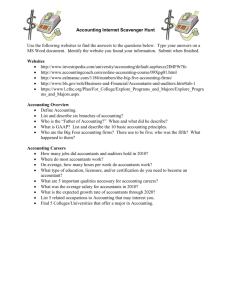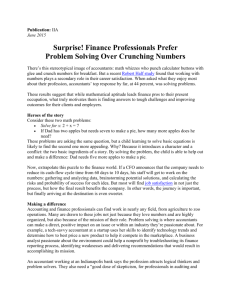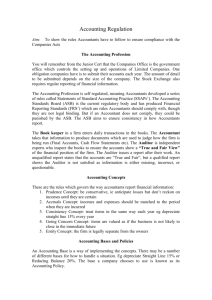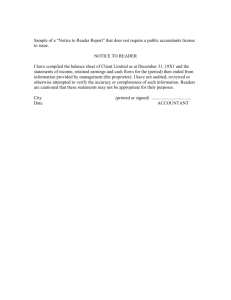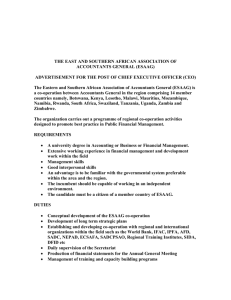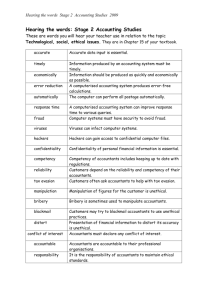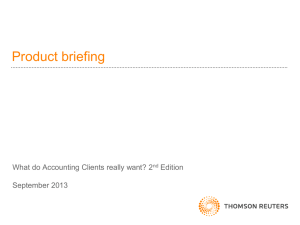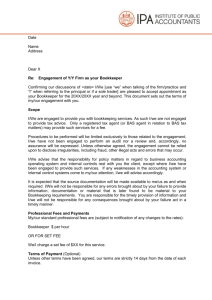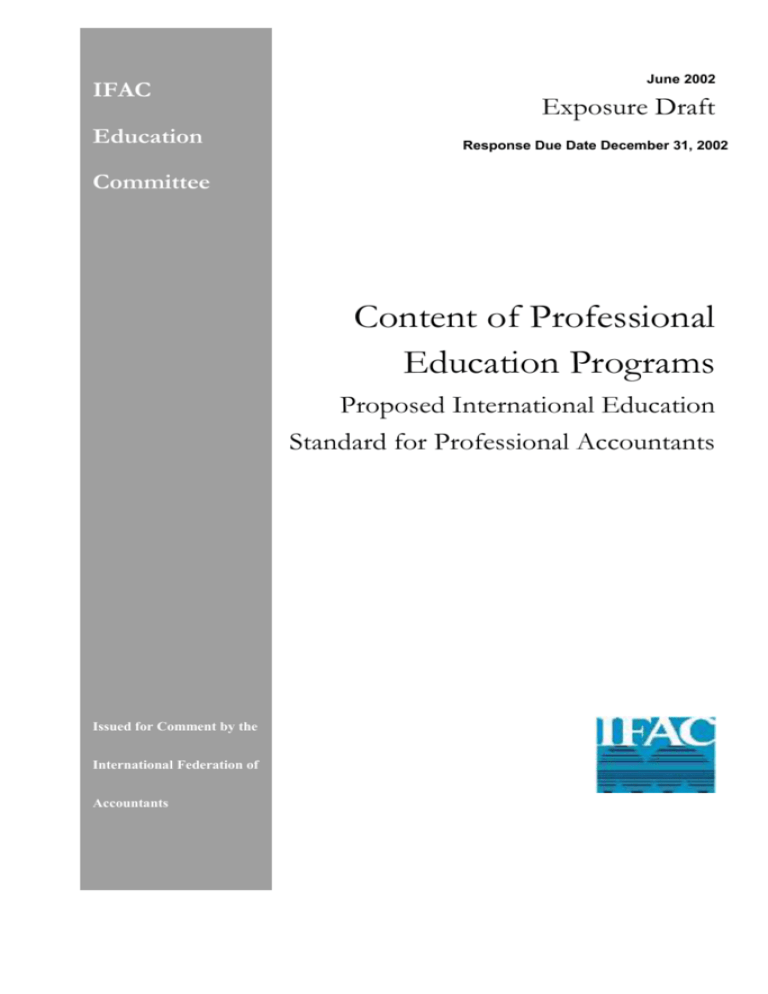
IFAC
Education
June 2002
Exposure Draft
Response Due Date December 31, 2002
Committee
Content of Professional
Education Programs
Proposed International Education
Standard for Professional Accountants
Issued for Comment by the
International Federation of
Accountants
This Exposure Draft was approved for publication in June 2002 by the
Education Committee of IFAC.
The mission of IFAC is the worldwide development and enhancement of
an accountancy profession with harmonized standards, able to provide
services of consistently high quality in the public interest. The Education
Committee’s mission is to serve the public interest by the worldwide
advancement of education and development for professional accountants
leading to harmonized standards.
The Education Committee requests comments on this Exposure Draft.
Respondents are encouraged to comment on the specific questions
attached at the end of this document and any other issues related to this
Exposure Draft. Comments sent by e-mail are preferred but they may also
be submitted by computer disk or in hard copy.
Comments should be received by 31 December 2002.
Comments received by the due date will be reviewed by the Education
Committee and may influence the final Standard. Comments received
before 15 October 2002 will be reviewed by the Education Committee at
its meeting in November 2002. Comments received after that date will be
reviewed by the Committee in March 2003. Notwithstanding this,
comments received after the due date and on an ongoing basis are also
welcome. Respondents should note that comments are considered a matter
of public record.
Comments on this publication should be sent to:
Technical Director
International Federation of Accountants
535 Fifth Avenue, 26th Floor
New York, NY 10017, USA
Fax 212-856 9420
E-mail responses should be sent to: EDComments@ifac.org
Information about the International Federation of Accountants can be
found at its web site, www.ifac.org. Copies of this publication may be
downloaded free of charge from the site.
Copyright © June 2002 by the International Federation of Accountants.
All rights reserved.
Content of Professional Education Programs
Proposed International Education Standard for
Professional Accountants
CONTENTS
PAGE
PREFACE .............................................................................................. 2
INTERNATIONAL EDUCATION STANDARDS FOR PROFESSIONAL
ACCOUNTANTS ............................................................................. 2
PURPOSE OF THIS STANDARD .......................................................... 2
SCOPE OF THE STANDARD ........................................................... 3
BACKGROUND .............................................................................. 3
DEFINITIONS ....................................................................................... 3
EFFECTIVE DATE ............................................................................... 9
FOREWORD ......................................................................................... 9
ACKNOWLEDGEMENTS................................................................... 10
MEMBERSHIP OF THE IFAC EDUCATION COMMITTEE ............ 10
CONTENT OF PROFESSIONAL EDUCATION PROGRAMS ........... 11
DISCUSSION QUESTIONS ................................................................. 19
Content of Professional Education Programs
Preface
International Education Standards for Professional Accountants
1.
International Education Standards for Professional
Accountants (IES) prescribe standards of generally accepted
“good practice” in the education and development of
professional accountants. IES express the benchmarks that
member bodies are expected to meet in the preparation and
continual development for professional accountants. They
establish the essential elements of the education process at a
level that is aimed at gaining international recognition,
acceptance and application of the education process. Hence,
member bodies must consider these prescriptions.
2.
International Education Standards for Professional
Accountants cannot legally override local laws and
regulations but will provide an authoritative reference for
informing and influencing local regulators regarding
generally accepted “good practice.”
3.
International Education Standards are paragraphs in bold
typeface in this Standard. Commentary paragraphs, which
may elaborate on and assist in the interpretation of the
Standard paragraphs, appear in plain typeface.
4.
The individual Standards need to be read in conjunction
with the Guiding Principles for International Education
Statements and the related commentary and implementation
material contained in the Introduction to International
Education Standards for Professional Accountants).
Purpose of this Standard
5.
This Standard prescribes the professional education
candidates require to qualify as professional accountants.
6.
The aim of this Standard is to ensure that candidates for
membership of an IFAC member body have enough
advanced professional education to enable them to function
as competent professional accountants in an increasingly
2
Definitions
complex and demanding environment. The issue of keeping
up this competence is dealt with in IES 100, “Continuing
professional education and development.”
Scope of the Standard
7.
This standard prescribes the primary content of professional
education programs under three major headings:
organizational and business knowledge, IT knowledge and
accounting, finance and related knowledge. It does not
prescribe the professional skills required and the content of
general education, or the requirements related to practical
experience (please refer to proposed International Education
Standards, “Professional Skills and General Education,” and
“Experience Requirements”.
Background
8.
This Standard draws on IEG 9, “Prequalification Education,
Assessment of Professional Competence and Experience
Requirements” (first issued 1991, revised 1996) and IEG 11,
“Information Technology for Professional Accountants”
(first issued 1995, revised 1998 and 2002).
Definitions
9.
Definitions and explanations of the key terms used in the
Standards are set out in the Guiding Principles for
International Education Statements. The terms used in this
Standard are defined as follows. Words marked with an
asterisk (*) indicate terms that are defined elsewhere in this
glossary.
Candidate
Refers to any individual who is presenting
themselves for assessment as part of an
education program in preparation to become a
professional accountant.*
Competence
Is being able to perform a work role to a
defined standard, with reference to real
working environments.
3
Content of Professional Education Programs
Explanation
Competence may be assessed by a variety of
means, including work-place performance,
work-place simulations, written tests of various
types and self-assessment.
[Competence-based Approaches to the
Preparation and Work of Professional
Accountants, 2001]
Development
Is the acquisition of capabilities* which
contribute to competence.*
Explanation
Development refers to the growth of attributes
that contribute to competence, however
achieved. Individuals may develop their
abilities through a wide range of processes
such as learning, including education and
training; experience; reflection; observation or
receipt of information; other structured and
unstructured learning activities; or through
natural growth over time.
Education
Refers to a systematic act or process aimed at
developing knowledge, skills, character or
other abilities and attributes within individuals.
It includes developmental activities commonly
referred to as training.*
Explanation
Education is a formal, structured learning
process whereby individuals develop attributes
considered desirable by society. Education is
usually characterized by the growth of an
individual’s mental and practical abilities, as
well as maturing in attitude, resulting in an
enhanced ability of the individual to function
and contribute to society, in either specific or
non-specific contexts. While often conducted in
academic environments, education also
includes formal learning processes in other
4
Definitions
environments, such as on-the-job and off-thejob training. Education is, by nature, formal
and therefore excludes informal, unstructured
learning and developmental processes.
Valuable learning, training, and development
can also take place in less formal environments
through processes that are not formal or
structured enough to be considered
“education.”
Ethics
Refers to the professional values* and
principles of conduct applying to professional
accountants,* as well as to students* and
trainees,* associated with IFAC member
bodies.
General education
Consists of subjects drawn from the arts,
sciences, social sciences and humanities that
are outside the discipline areas of accounting
and business.
Explanation
General education covers a broad range of
subjects of which the content is not primarily
concerned with business matters. The
knowledge gained from general education
underpins a professional education, although it
is not directly related to, or required for,
conducting business activity. It contributes to
professional competence by imparting
knowledge of the world, broadening the
candidate’s mind, and providing a more
rounded education than that gained by business
study alone.
Good Practice
Refers to those elements considered essential to
the education* and development* of
professional accountants* and performed at a
standard necessary to the achievement of
competence.*
5
Content of Professional Education Programs
Explanation
“Good practice” relates not only to the range
of content and processes of education and
development programs, but also to the level or
standard at which they are performed (i.e., the
depth and quality of the programs). The IFAC
Education Committee is conscious of the wide
diversity of culture, language and educational,
legal and social systems in the countries of the
member bodies and of the variety of functions
performed by accountants. Different factors
within these environments may vary the ability
of member bodies to adopt some aspects of
“good practice.” Nevertheless, member bodies
should continuously aspire to “good practice”
and achieve it wherever possible.
Practical Experience
(or professional
experience)
Is work experience, undertaken by a trainee*
that is relevant to the work of professional
accountants.* The program of experience is
aimed at developing professional competence*
(including values) within trainees and provides
a means whereby trainees can demonstrate the
achievement of professional competence.
Explanation
Practical experience refers to the on-the-job
execution of tasks that are relevant to the field
of accountancy. The practical experience
component of the qualifying process is intended
to develop candidates through the direct
application of knowledge, skills, and
professional values. Ultimately, it is through
practical experience that trainees will
demonstrate their competence to perform the
roles of professional accountants. Practical
experience is sometimes referred to as
“professional experience” and is synonymous
with that term.
6
Definitions
[By reference to the Discussion Paper Practical
Experience, 1998]
Pre-Qualification
Refers to the period before qualification* as an
individual member of an IFAC member body.
Explanation
The term “pre-qualification” is usually
associated with activities and requirements
relating to the development of those who have
not yet obtained a professional qualification. It
refers to the developmental period, or any part
of the developmental period, between the time
at which an individual begins their professional
development and the time at which they achieve
initial professional competence, as recognized
by qualification.
Professional
accountant
Refers to those individuals, whether they be in
public practice (including a sole practitioner,
partnership or corporate body), industry,
commerce, the public sector or education, who
are members of an IFAC member body.
[IFAC Code of Ethics for Professional
Accountants, 2001]
Professional
accounting
Education
Refers to education* that builds on general
education* and imparts professional accounting
knowledge,* skills* and values.* It may or may
not take place in an academic environment.
Professional
knowledge
Refers to those topics that make up the subject
of accountancy as well as other business
disciplines that, together, constitute the
essential body of knowledge for professional
accountants.*
Professional values
Are the attitudes that identify professional
accountants* as members of a profession. They
comprise principles of conduct generally
associated with, and deemed essential in
defining the distinctive characteristics of,
professional behavior.
7
Content of Professional Education Programs
Explanation
Professional values include technical
competence,
ethical
behavior
(e.g.,
independence, objectivity, confidentiality and
integrity), professional demeanor (e.g., due
care, timeliness, courteousness, respect,
responsibility and reliability), pursuit of
excellence (e.g., commitment to continual
improvement and life-long learning) and social
responsibility
(e.g.,
awareness
and
consideration of the public interest).
Qualification
Qualification as a professional accountant* is
recognition that, at a given point in time, an
individual is deemed to have met the
requirements for recognition as a professional
accountant.
Explanation
Qualification is the formal recognition of an
individual as having attained a professional
designation, or having been admitted to a class
of professional membership, that signifies the
individual is a professional accountant.
Qualification implies that the individual has
been deemed competent in terms of meeting the
requirements prescribed for obtaining
professional accountant status. While the term
“qualification” can be applied to various
stages of professional development and classes
of membership, its usage in IFAC Education
Committee documents (unless otherwise
indicated) relates to the benchmark for
recognition as a professional accountant.
[Based on IEG-9, “Pre-qualification
Education, Assessment of Professional
Competence and Experience Requirements of
Professional Accountants,” 1998]
Skills
8
Refer to the various types of abilities required
to apply knowledge and values appropriately
Effective Date
and effectively in a professional context.
Explanation
Professional accountants are to possess a
range of skills, including technical and
functional skills, organizational and business
management
skills,
personal
skills,
interpersonal and communication skills, a
variety of intellectual skills, and skills in
forming professional judgments.
Specialization
Is the formal recognition by a member body of
a group of its members possessing distinctive
competence* in a field, or fields, of activity
related to the work of the professional
accountant.*
[Discussion Paper Specialization in the
Accounting Profession, 1992]
Effective Date
10.
Member bodies should aim to comply with this standard by 1
January 2005. Earlier application is encouraged.
Foreword
11.
Professional education builds on general education. Professional
education may or may not take place in an academic
environment. Candidates who wish to become professional
accountants need to acquire the knowledge, skills and
professional values required.
12.
The body of knowledge accountants need to acquire to function
competently is constantly changing and expanding. Local
conditions also call for variations in the knowledge base
required. In addition, accountants will specialize during their
careers. For these reasons, this Standard sets out only broad
subject headings on the premise that professional accountants
will need to continually update their knowledge.
9
Content of Professional Education Programs
Acknowledgements
The Education Committee thanks the Task Force members who have
contributed to the development of this Exposure Draft:
Country
Czech Republic
Hungary
Israel
Malaysia
Turkey
United Kingdom
Transnational Auditors Committee
Name
Bohumil Král and Jaroslav Louka
József Roóz and Ferenc Eperjesi
Yoram Eden
Dato Abdul Halim Mohyiddin, Tan
Shook Kheng and Albert Wong
Mun Sum
Ercan Bayazitli, Recep Pekdemir
and Masum Türker
David Hunt, Mark Allison, and
Michael Walsh.
Hans Verkruijsse (observer to the
Education Committee)
Membership of the IFAC Education Committee
The following were members of the Education Committee when this
Exposure Draft was approved:
Country
New Zealand
Argentina
Canada
China
Czech Republic
France
Hungary
Israel
Malaysia
Pakistan
South Africa
Thailand
Turkey
United Kingdom
United States
10
Name
Warren Allen (Chair)
Hector Carlos Ostengo
Shirley Reilly
Shuang Li
Bohumil Král
Alain Burlaud
József Rooz
Yoram Eden
Abdul Halim Mohyiddin
S.M. Zafarullah
Steve McGregor
Usana Patramontree
Masum Türker
David Hunt
Gary Holstrum.
Content of Professional Education Programs
Content of Professional Education Programs
13.
The professional education component of prequalification education should consist of at least two
years or more of full-time academic study (or the parttime equivalent) and should enhance the intellectual,
personal, interpersonal and communication skills
provided in general education. Professional education
consists of:
organizational and business knowledge;
information technology knowledge; and
accounting, finance and related knowledge.
14.
The professional education component is only part of the
pre-qualification education program. It may or may not take
place in an academic environment. Some degree programs
may, in addition to requiring up to two years of general
studies, devote at least another two years to accounting
studies. More specialist accounting degrees may incorporate
general studies within a three-year program. The exact
combination of general studies, accounting studies and
practical experience may differ from one program to another
as long as the same professional competences are achieved.
15.
Organizational and business knowledge provides the context
in which professional accountants work. A broad knowledge
of business, government and not-for-profit organizations,
how they are organized, financed and managed, and the
global environment in which they operate is essential to the
functioning of a professional accountant.
16.
Information technology has transformed the role of the
professional accountant. The professional accountant not
only uses information systems and exercises IT controls
skills, but also plays an important role in the evaluation,
design and management of such systems.
17.
Accounting, finance and related knowledge provide the
strong technical foundation essential to a successful career
as a professional accountant. The mix of topics may differ
11
Content of Professional Education Programs
according to which sectors or locations individuals work in,
although many of the topics are likely to be shared by most
professional accountants. The accounting curriculum is
itself changing and will continue to change in response to
rapidly changing market demands. New topics are entering
the curriculum and the relative emphasis as between topics
is altering. Member bodies may wish to add topics, or alter
the balance of their programs, to meet the needs of their
particular environments.
18.
19.
12
The organizational and business knowledge component
should include all, or substantially all, of the following
subject areas:
economics;
business environment;
financial markets;
quantitative methods;
organizational behavior;
operations management;
marketing;
international business;
globalization; and
corporate governance and business ethics.
Organizational and business education equips prospective
professional accountants with knowledge of the
environment in which employers and clients operate. It also
furnishes the context for the application of the intellectual,
interpersonal and communication skills acquired during the
overall pre-qualification process. It provides:
a knowledge of macro- and micro-economics;
a knowledge of business and financial markets and how they
operate;
the application of quantitative methods and statistics to
business problems;
Content of Professional Education Programs
20.
21.
an understanding of organizations and of the environments
in which they operate, including the major economic, legal,
political, social, technical, international and cultural forces
and their influences and values;
an understanding of environmental issues and sustainable
development;
an understanding of interpersonal and group dynamics in
organizations, including the methods for creating and
managing change in organizations;
an understanding of personnel issues, operations
management, organizational strategy and governance, and
marketing;
a basic knowledge of international trade and finance and the
ways in which international business is conducted, as well
as the processes of globalization;
an understanding of the role of the accountant in corporate
governance and business ethics; and
an ability to integrate the above components in
accomplishing strategic objectives.
The information technology requirements should include
all, or substantially all, of the following subject areas:
general knowledge of IT;
IT control knowledge;
IT control competences;
IT user competences; and
one of, or a mixture of, the competences of, the roles of
manager, evaluator or designer of information systems.
The requirements for the information technology knowledge
component and competency for professional accountants are
set out in International Education Guideline IEG 11,
“Information Technology for Professional Accountants.” At
the pre-qualification stage, all candidates should obtain a
general knowledge of IT, plus knowledge of and
13
Content of Professional Education Programs
competence in IT control systems, as well as competence as
an IT user.
22.
Furthermore, as part of their pre-qualification education, all
professional accountants are expected to concentrate on at
least one of the other roles identified in the Guideline and
acquire the competences identified for the role(s) in which
they are expected to function at qualification. The roles are
that of manager, designer or evaluator of information
systems, or a combination of these roles. One example given
is that of IT strategy advisor/consultant.
23.
At the point of qualification, candidates are expected to have a
thorough knowledge and understanding of the competency
elements in at least one of these roles. This may be evidenced by
the ability to describe or explain the significance of the issues
related to the listed competencies in a relevant business setting.
A candidate in this role should be able to participate effectively
in the activities listed in this section as part of a team or under
supervision, but would not to be expected to demonstrate
proficiency in all the competences.
24.
At the pre-qualification stage, all professional accountants
require the following body of IT knowledge related to
business systems (for more detail, see IEG 11, “Information
Technology for Professional Accountants”):
IT architecture;
system acquisition/development process;
management of IT;
IT strategy; and
business process enablement.
25. All professional accountants, irrespective of their primary
work domain or role, also require the following body of IT
control knowledge related to business systems (for more
detail, see IEG 11, “Information Technology for
Professional Accountants”):
14
Content of Professional Education Programs
26.
27.
control frameworks;
control objectives;
layers of control;
responsibility for control;
control environment;
control over system acquisition/development;
risk assessment;
control activities;
information and communication; and
monitoring of control compliance.
All professional accountants should acquire the following broad
areas of competency in IT controls related to business systems
(for more detail, see IEG 11, “Information Technology for
Professional Accountants”):
select suitable control criteria to analyze and evaluate
controls;
evaluate control environment;
evaluate system acquisition/development process and
controls;
evaluate risk assessment processes and activities;
evaluate system processing operations and controls; and
evaluate monitoring processes and activities.
Users of various information technologies employ information
systems tools and techniques to help them meet their objectives
or to help others meet their objectives. These objectives, and
hence the types and uses made of IT tools and techniques, can be
endless in their variety. Some typical tasks that users carry out
with the help of IT include:
15
Content of Professional Education Programs
28.
29.
16
gathering and summarizing information;
choosing alternative courses of action on the basis of
analyses applied to data;
devising strategies and tactics;
planning and scheduling operational activities in an
organizational unit;
directing the allocation of resources;
implementing operations;
evaluating performance;
documenting observations;
making judgments and decisions; and
communicating with others.
All professional accountants need to be familiar with these
broad tasks and the ways in which information technologies
and systems can be applied to these tasks. The following
broad areas of competency relate to the user role:
apply appropriate it systems and tools to business and
accounting problems;
demonstrate an understanding of business and accounting
systems; and
apply controls to personnel systems.
The information technology knowledge component may be
provided in a variety of ways, perhaps as separate courses or
by integrating the subject into the organizational and
business knowledge component or into the accounting and
accounting related knowledge component. Competency may
also be acquired through work experience. For the formal IT
education component, case studies, interactions with
experienced professionals and similar techniques should be
used to enhance the presentation of subject matter and to
help students develop practical skills.
Content of Professional Education Programs
30.
31.
The accounting, finance and related knowledge
component should include coverage of all, or
substantially all, the following subject areas:
financial accounting and reporting;
management accounting and control;
taxation;
business and commercial law;
audit and assurance;
finance and financial management;
strategic decision making; and
professional values and ethics.
The accounting, finance and related knowledge component
further develops and integrates the knowledge, skills and
professional values from elsewhere into the subject areas all
accountants need to be exposed to. It gives students the
necessary theoretical and technical accounting knowledge,
at least at degree level, as well as an understanding of
professional values and ethics, for launching their careers as
professional accountants. This component includes:
history of the accounting profession and accounting thought;
content, concepts, structure and meaning of reporting for
organizational operations, both for internal and external use,
including the information needs of financial decision makers
and a critical assessment of the role of accounting
information in satisfying those needs;
national and international accounting and auditing
standards;
the regulation of accounting;
management accounting, including planning and budgeting,
cost management, quality control and benchmarking;
17
Content of Professional Education Programs
18
the concepts, methods and processes of control that provide
for the accuracy and integrity of financial data and
safeguarding of business assets;
taxation and its impact on financial and managerial
decisions;
a knowledge of the business legal environment, including
securities and companies law, appropriate for the role of the
profession in the particular country;
the nature of auditing and other assurance services and the
conceptual and procedural bases for performing them;
a knowledge of finance and financial management,
including financial statement analysis, financial instruments,
capital markets – both domestic and international – and
managing resources;
decision support and strategy, including business advice,
strategic management, risk management and change
management;
ethical and professional responsibilities of an accountant in
relation to both the professional and wider public
environment;
the role of accountants in corporate governance; and
environmental issues and sustainable development.
Discussion Questions
Discussion Questions
Please reference comments to the relevant paragraph numbers and provide
alternative proposals where applicable.
1.
Are there any essential elements of professional education
programs that have not been included in this Standard? Are
any elements of professional education programs included
in this standard no longer relevant or considered of primary
importance? (Refer paragraphs 13, 18, 20 and 30.)
2.
Do you consider the subject content can reasonably be
covered within the time and resources normally available
during a program of professional education?
3.
Comment on the proposed effective date of 1 January 2005.
4.
Please comment on any other issues.
19

